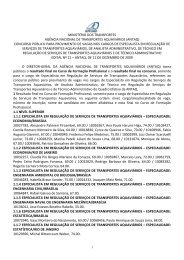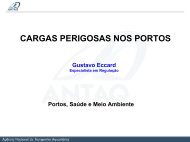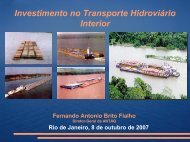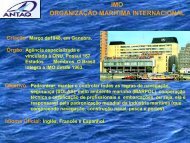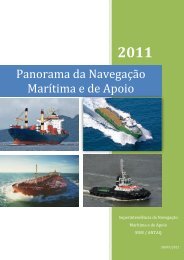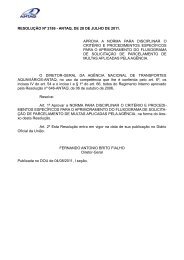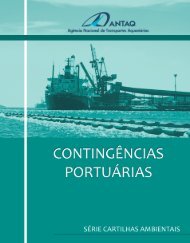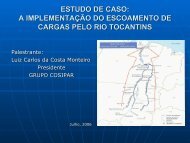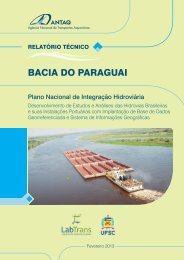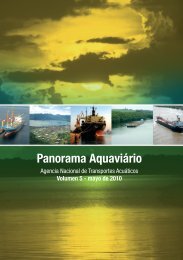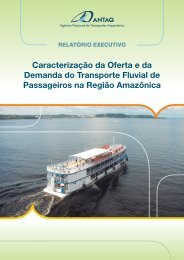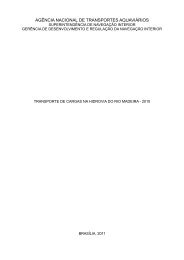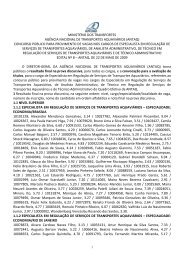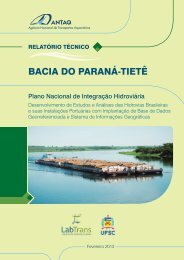Waterway Panorama - Antaq
Waterway Panorama - Antaq
Waterway Panorama - Antaq
You also want an ePaper? Increase the reach of your titles
YUMPU automatically turns print PDFs into web optimized ePapers that Google loves.
l <strong>Waterway</strong> <strong>Panorama</strong><br />
tion of the port space in terms of transit cargo,<br />
these studies allow for the obtaining of environmental<br />
clearance for activities arising from it.<br />
The qualification process occurs by licensing, in<br />
which the environmental impact assessment is<br />
the primary element. The assessment uses studies<br />
of the PDZ environmentally developed.<br />
Another advantage environmental studies in<br />
the Development and Zoning Plan is that, being<br />
factors of activity organization according to criteria<br />
of environmental quality, they effectively<br />
improve management. For example, grouping<br />
similar activities provides the concentration of<br />
environmental control instruments that are specific<br />
for that particular area. If the port holds set<br />
of facilities for bulk liquids, oil and byproducts,<br />
in a particular area, it should focus on devices to<br />
combat pollution by oil and byproducts.<br />
Similarly, if a particular part of the organized<br />
port holds a number of facilities for bulk solids,<br />
such as grains, this area should focus on devices<br />
for dealing with particles that pollute the air.<br />
The proper arrangement of the loads from<br />
the standpoint of environmental quality brings<br />
a considerable gain for the management of<br />
those parts of the organized port and the port<br />
as a whole.<br />
Last but not least, some ports have sensitive<br />
areas of the environmental point of view that<br />
does not allow any further impact on those locations.<br />
Tankage facilities are some that create<br />
that situation by casting. Many are also located<br />
inappropriately in the middle of big cities, with<br />
the risks inherent in this situation.<br />
The appropriate arrangement of the cargoes,<br />
from the environmental quality standpoint,<br />
brings considerable gains in the management<br />
of parts of the organized port and the<br />
port as a whole.<br />
Last but not least, some ports have environmentally<br />
sensitive areas that do not allow for any<br />
further impact on those locations. Tankage facilities<br />
are among those that create that situation<br />
by leakage. They are usually inappropriately located<br />
in the middle of large cities, with the risks<br />
inherent in this situation.<br />
These are the considerations that are being<br />
proposed for the formulation of a PDZ based on<br />
the environment, which would be established<br />
as a basic rule to be followed by ports. The<br />
work is still widely discussed before being finalized<br />
with internal and external audiences of the<br />
Agency. This proposal is backed by the Bylaws of<br />
the Agency (Law 10,233/01), which has been<br />
given the task to seek activities with environmental<br />
quality.<br />
Once made, the studies would meet the obligations<br />
of the Boards of the Port Authority and<br />
port authorities that conducted and approved<br />
them, to protect the environment, in accordance<br />
with Articles 30 and 33 of Law 8,630/93.<br />
With a system of environmental clearance for<br />
port activities, based on licensing, any environmental<br />
intervention for expansion shall require<br />
an assessment of its significant impacts to the<br />
environment. Knowledge of the impacts is a key<br />
part of control and command process that licensing<br />
agencies and stakeholders involved<br />
should exercise, as well as other public representatives<br />
of the Brazilian society in this field.<br />
Although it is an appropriate system, it was<br />
designed and set up during the 80s and regulated<br />
in 90s, with content relating to precaution,<br />
valid at the time, but now it may be simplified for<br />
the benefit of the entire Brazilian society. It was<br />
created within the principle of constant improvement,<br />
which suggests its revision in some cases.<br />
58



